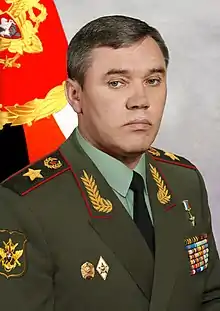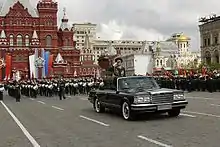Valery Gerasimov
Valery Vasilyevich Gerasimov (Russian: Вале́рий Васи́льевич Гера́симов, IPA: [vɐˈlʲerʲɪj vɐˈsʲilʲɪvʲɪtɕ gʲɪˈrasʲɪməf]; born 8 September 1955) is a Russian General of the Army, the current Chief of the General Staff of the Armed Forces of Russia, and first Deputy Defence Minister, replacing Nikolay Makarov. He was appointed by President Vladimir Putin on 9 November 2012.[2][3][4]
Valery Gerasimov Вале́рий Гера́симов | |
|---|---|
 Gerasimov in an official portrait from 2013 | |
| Born | 8 September 1955 Kazan, Tatar ASSR, Soviet Union |
| Allegiance | |
| Service/ | Soviet Armed Forces Russian Armed Forces |
| Years of service | 1976–present |
| Rank | |
| Commands held | Chief of the General Staff Deputy Chief of the General Staff Central Military District Moscow Military District Leningrad Military District 58th Army 144th Guards Motor Rifle Division |
| Battles/wars | Second Chechen War War in Donbass (suspected) Syrian Civil War |
| Awards | Hero of the Russian Federation Order of Honour Order of St. George (3rd and 4th Class) |
Gerasimov is the strategist alleged to have conceived the "Gerasimov doctrine" – combining military, technological, information, diplomatic, economic, cultural and other tactics for the purpose of achieving strategic goals.[5] However, this was later retracted by the author of the original paper, Mark Galeotti, who claimed the doctrine never existed at all.[6][7]
Education
Born in Kazan, Tatar ASSR, he graduated from the Kazan Suvorov Military School (1971–1973), the Kazan Higher Tank Command School, named after the Supreme Soviet of the Tatar Autonomous Soviet Socialist Republic (1973–1977), the Malinovsky Military Armored Forces Academy (1984–1987), and the Military Academy of the General Staff of the Armed Forces of Russia (1995–1997).[4]
Commands
After graduating from the Kazan Higher Tank Command School, Gerasimov was the commander of a Mechanized Infantry platoon, company and battalion of the Far Eastern Military District. Later he was chief of staff of a Tank regiment and then of a motorized rifle division in the Baltic Military District.[4] From 1993 to 1995 he was the commander of the 144th Guards Motor Rifle Division in the Baltic Military District and then the North Western Group of Forces.[4][8]
After he graduated from the General Staff's academy, he was First Deputy Army Commander in the Moscow Military District and commander of the 58th Army in the North Caucasus Military District during the Second Chechen War.[4] His involvement in the arrest of Yury Budanov led to praise from journalist Anna Politkovskaya.[3][4]
In 2006 he became commander of Leningrad Military District and moved to be the commander of Moscow Military District in 2009 and Central Military District in April 2012. On 23 December 2010 he became deputy Chief of the General Staff.[4]

He commanded the Victory Day Parade in Moscow four times: 2009 to 2012.[3]
Appointment
Gerasimov was appointed Chief of General Staff following the dismissal of Defence Minister Anatoliy Serdyukov on 6 November 2012. The previous Chief of General Staff, Army General Nikolay Makarov, was seen as close to Serduykov and was seen by commentators as likely to be replaced by new Defence Minister Sergey Shoygu. It has been reported that Makarov resigned, but he was formally dismissed by President Vladimir Putin. Other changes were the dismissal of Alexander Sukhorukov from the position of First Deputy Defence Minister and his replacement by Colonel General Arkady Bakhin, formerly commander of the Western Military District. Aerospace Defence Forces commander Colonel General Oleg Ostapenko was also promoted to Deputy Defence Minister. He was promoted to the highest rank in the Russian Army, General of the Army as of 2014.[2][9][10][11]
According to the Security Service of Ukraine, Gerasimov was in fact the general commander of all elements of Russian forces and also the pro-Russian insurgents during their decisive strategic victory in the Battle of Ilovaisk in 2014, where over 1,000 Ukrainian soldiers were killed.[12]
.jpg.webp)
On 15 September 2016, he and Turkish chief of staff General Hulusi Akar conducted a meeting on the future of Syria in the Ankara headquarters of the Turkish Armed Forces.
Sanctions
In April 2014, Gerasimov was added to the list of persons against whom the European Union introduced sanctions "in respect of actions undermining or threatening the territorial integrity, sovereignty and independence of Ukraine".[13] In May 2014, Canada, Liechtenstein, and Switzerland added Gerasimov to their sanctions listed because of Russian interference in Ukraine and his responsibility for the massive Russian troop deployment next to the Russia-Ukraine border and his inability to reduce the tensions with Ukraine which are associated with these Russian troop deployments.[14] In September 2014, Australia placed Gerasimov on their Ukraine related sanctions list as well.[14]
Awards
![]() Order of Military Merit
Order of Military Merit
![]() Order For Merit to the Fatherland(3rd Grade)
Order For Merit to the Fatherland(3rd Grade)
![]() Order For Merit to the Fatherland (4th Grade)
Order For Merit to the Fatherland (4th Grade)
![]() Merit for Motherland in the USSR Armed Forces (3rd grade).[4]
Merit for Motherland in the USSR Armed Forces (3rd grade).[4]
![]() Medal for Battle Merit
Medal for Battle Merit
![]() Jubilee Medal "60 Years of the Armed Forces of the USSR"
Jubilee Medal "60 Years of the Armed Forces of the USSR"
![]() Jubilee Medal "70 Years of the Armed Forces of the USSR"
Jubilee Medal "70 Years of the Armed Forces of the USSR"
![]() Medal For Valour 1st Class
Medal For Valour 1st Class
![]() Medal "For strengthening of brotherhood in arms"
Medal "For strengthening of brotherhood in arms"
![]() Medal For "200 years to the Ministry of Defence"
Medal For "200 years to the Ministry of Defence"
![]() Medal For "20 Years of Impeccable Service"
Medal For "20 Years of Impeccable Service"
![]() Medal For "15 Years of Impeccable Service"
Medal For "15 Years of Impeccable Service"
![]() Medal For "10 Years of Impeccable Service"
Medal For "10 Years of Impeccable Service"
![]() Order of the Friendship of Peoples
Order of the Friendship of Peoples
![]() Order of St. George (3rd Class)
Order of St. George (3rd Class)
![]() Order of St. George (4th Class)
Order of St. George (4th Class)
![]() Order of Honour
Order of Honour
![]() Hero of the Russian Federation
Hero of the Russian Federation
Personal life
He is married and has a son.[15]
References
- Указ Президента Российской Федерации от 20 февраля 2013 года № 151 "О присвоении воинских званий высших офицеров военнослужащим Вооруженных Сил Российской Федерации" [Presidential Decree of 20 February 2013 No. 151 "On conferring military rank of senior officers of the armed forces] (in Russian). Kremlin.ru. 21 February 2013. Archived from the original on 30 June 2015. Retrieved 24 February 2013.
- "New appointments at Defence Ministry". Kremlin.ru. 9 November 2012. Retrieved 9 November 2012.
- "Profile: Russia's new military chief Valery Gerasimov". BBC News. 9 November 2012. Retrieved 9 November 2012.
- "Valeriy Gerasimov". Russian Ministry of Defence. Retrieved 9 November 2012.
- "The 'Gerasimov Doctrine' and Russian Non-Linear War | King's College London". kcl.rl.talis.com. Retrieved 2018-03-06.
- Galeotti, Mark (2018). "The mythical 'Gerasimov Doctrine' and the language of threat". Critical Studies on Security. 7 (2): 157–161. doi:10.1080/21624887.2018.1441623. S2CID 159811828.
- "I'm Sorry for Creating the 'Gerasimov Doctrine'". Foreign Policy. Retrieved 2018-03-06.
- http://smolensk-i.ru/authority/komandir-smolenskoy-divizii-vozglavil-genshtab-armii-rossii_9527
- Gorenburg, Dmitry (6 November 2012). "The firing of Anatoly Serdyukov". Russian Military Reform. Retrieved 11 November 2012.
- "Personnel changes at Defence Ministry". Kremlin.ru. Retrieved 11 November 2012.
- "Putin Appoints New Chief of General Staff". RIA Novosti. 9 November 2012. Retrieved 11 November 2012.
- "Russian Army General Staff Chief Gerasimov, ten Russian military servicemen suspected of involvement in Ilovaisk tragedy - SBU". Kyiv Post. 5 August 2015. Retrieved 3 January 2016.
- COUNCIL IMPLEMENTING REGULATION (EU) No 433/2014 of 28 April 2014 implementing Regulation (EU) No 269/2014 concerning restrictive measures in respect of actions undermining or threatening the territorial integrity, sovereignty and independence of Ukraine
- "Bryan Cave Side by Side List of Ukraine Related Sanctions" (PDF). Bryan Cave. Retrieved July 25, 2018.
- Валерий Васильевич Герасимов [Valery Vasilevich Gerasimov] (in Russian). Gazeta.ru. Retrieved 11 November 2012.
External links
| Wikimedia Commons has media related to Valery Gerasimov. |
| Military offices | ||
|---|---|---|
| Preceded by Nikolay Yegorovich Makarov |
Chief of the General Staff of the Armed Forces of the Russian Federation 2012–present |
Incumbent |